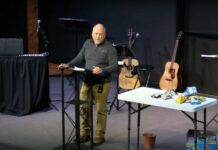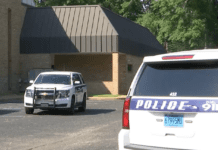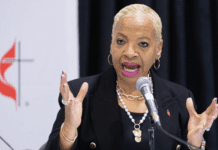Natalie Kahler, a Grove City alumna (’94) who authored the March 8 petition, identifies as a “very conservative” Republican who wants to see the school preserve its strong commitment to academic freedom. “To me, the whole point of an academic education at the collegiate level is to teach kids how to think, how to process information and how to hear debates and figure out where you land on them,” she told Religion News Service.
The earlier November petition against CRT received 478 signatures from students, parents and alumni. The petition cited as evidence of CRT “asserting itself at GCC” a fall 2020 chapel presentation by Jemar Tisby, a historian and author who writes on race and religion; a chapel that included a pre-recorded TED talk by Bryan Stevenson, an Equal Justice Initiative founder and criminal justice reform advocate; a Resident Assistant training that included the concepts of white privilege and white guilt; and several books used in an education studies class and in focus groups, including Ibram X. Kendi’s “How to be an Antiracist” and Wheaton professor Esau McCaulley’s “Reading While Black.”
“As biblically grounded Christians, we are not defensive about racism,” the November petition said. “Where it exists, we should repent of it. We are concerned, though, when our students are falsely convicted and unbiblically indicted simply because of their skin color.” The authors of the petition did not respond to Religion News Service in time to be included in this story.
President Paul McNulty addressed the initial petition in a Nov. 18 letter. In it, he also wrote that Grove City does not accept “critical theory” as a “proper framework for examining and understanding the real challenges faced in our fallen world today.”
Since then, the CRT debate has only gained traction. The authors of the November petition responded that they were unsatisfied with the president’s letter, and in the following months, Grove City faculty and administrators publicly defended the institution.
In February, an unknown number of faculty published an anonymous letter also expressing concern that some instances of how CRT was being taught at the school illustrated “misalignment between their approach and the historic mission and identity of the College.”
The letter, which called for an investigation of the concerns raised in the November petition and of Grove City’s handling of the petition, said McNulty and his leadership team had “tarnished the College’s status as a trusted conservative alternative” and “eroded commitment and goodwill among the College’s core constituency.”
On Feb. 16, the board issued its rejection of critical race theory. Two days later, 50 faculty members signed a letter, published in Grove City’s student paper, denouncing the earlier anonymous letter, saying it “does not speak for the faculty at large” and was “full of misunderstandings, half-truths and statements made without evidence.”
Warren Throckmorton, a professor of psychology who signed the second faculty letter, told Religion News Service that some faculty are unsure how to respond to the board’s rejection of critical race theory since it doesn’t offer a definition of CRT. “Are we talking about the CRT that is misused in social media, where it is referring to anything that anybody talks about related to race? Or is it the actual social science theory, or the actual legal theory of CRT?” he asked.
When asked whether the board’s statement was effectively a ban on critical race theory, McNulty told Religion News Service that the statement was an extension of the school’s mission, vision and values and that the new committee, the majority of whom are current board members, will provide guidance for next steps.











